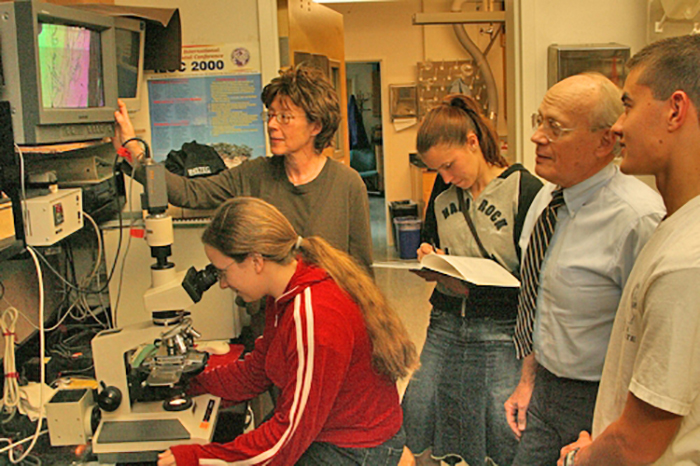Importance of Undergrad Research Affirmed With Latest NSF Grant
January 17, 2017
Considered a powerful form of engaged learning, undergraduate research is getting a boost from the National Science Foundation (NSF) to the delight of a dedicated team of academics seeking to promote highly effective undergraduate research environments.
Kerry Karukstis, chair of the Harvey Mudd College Department of Chemistry, along with colleagues Mitchell R. Malachowski, professor of chemistry and biochemistry at the University of San Diego, and Jeffrey M. Osborn, professor of biology and dean, School of Science, at the College of New Jersey, are co-principal investigators on a $1.7 million grant from the NSF titled “Integrating and Scaffolding Research into Undergraduate STEM Curricula: Probing Faculty, Student, Disciplinary, and Institutional Pathways to Transformational Change.” This is the third NSF grant they’ve received over the past 10 years that focuses on embedding undergraduate research into the culture and curricula of academic departments and institutions across the country.
While there is overwhelming evidence that the involvement of undergraduate students in collaborative research with faculty is a proven and powerful pedagogy, undergraduate research opportunities are still often optional and highly selective, missing the very students who could benefit the most. This project aims to provide all students with more equitable access to the benefits of undergraduate research by assisting STEM departments to create integrated and scaffolded curricula emphasizing discovery, inquiry and analysis.
“We are continuing to partner with the Council on Undergraduate Research (CUR) and Elizabeth Ambos, executive officer of CUR, in this effort,” says Karukstis, 2012 CUR Fellow and past CUR president. “I am particularly excited that we have involved Jillian Kinzie, associate director of the Center for Postsecondary Research and the NSSE Institute at Indiana University, as an additional partner in this project to examine the effect of student characteristics and disciplinary cultures on student learning.”
Study provides national assessment
A novel aspect of this project will be the development of both standardized and experimental questions on the National Survey of Student Engagement (NSSE) and the Faculty Survey of Student Engagement (FSSE). These surveys will allow for comparison of the institutions involved in this project with national results. The theory-of-change model that develops from this project will allow a broad and diverse range of institutional types and departments/disciplines to assess their readiness for research-scaffolded curricula and provide key insights into the effects of such curricular transformation on student achievement and organizational and cultural change.
Karukstis has held numerous leadership positions within CUR, and she was recognized as the CUR Volunteer of the Year in 2004 and again in 2010. She was the 2012 recipient of the CUR Fellows Award for leadership in undergraduate research. In 2003 she received the Henry T. Mudd Prize for Outstanding Service to Harvey Mudd College. Karukstis served from 2010 to 2013 as the chair of the faculty and is the Ray and Mary Ingwersen Professor of Chemistry. She researches classes of molecules that have the ability to self-assemble into complex three-dimensional structures when placed in water and other solvents.
Since 2009, Harvey Mudd College has been an enhanced institutional member of the Council on Undergraduate Research (CUR), which supports faculty and student development for high-quality undergraduate student-faculty collaborative research, scholarship and creative activities.
